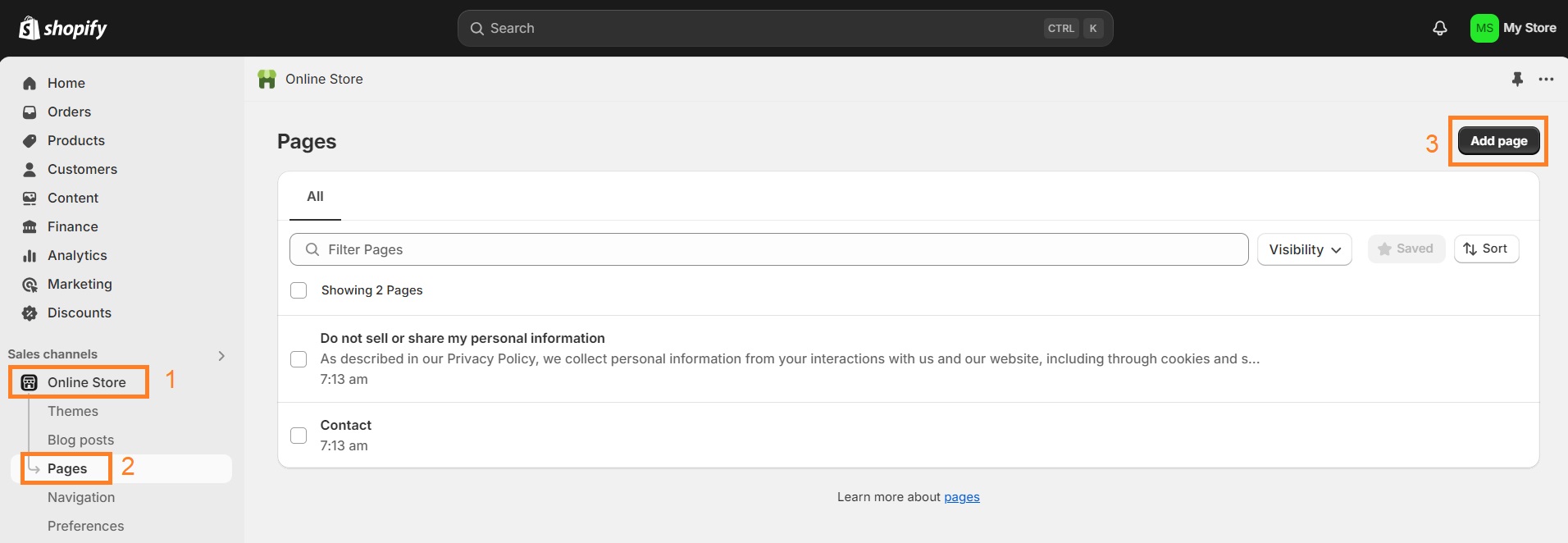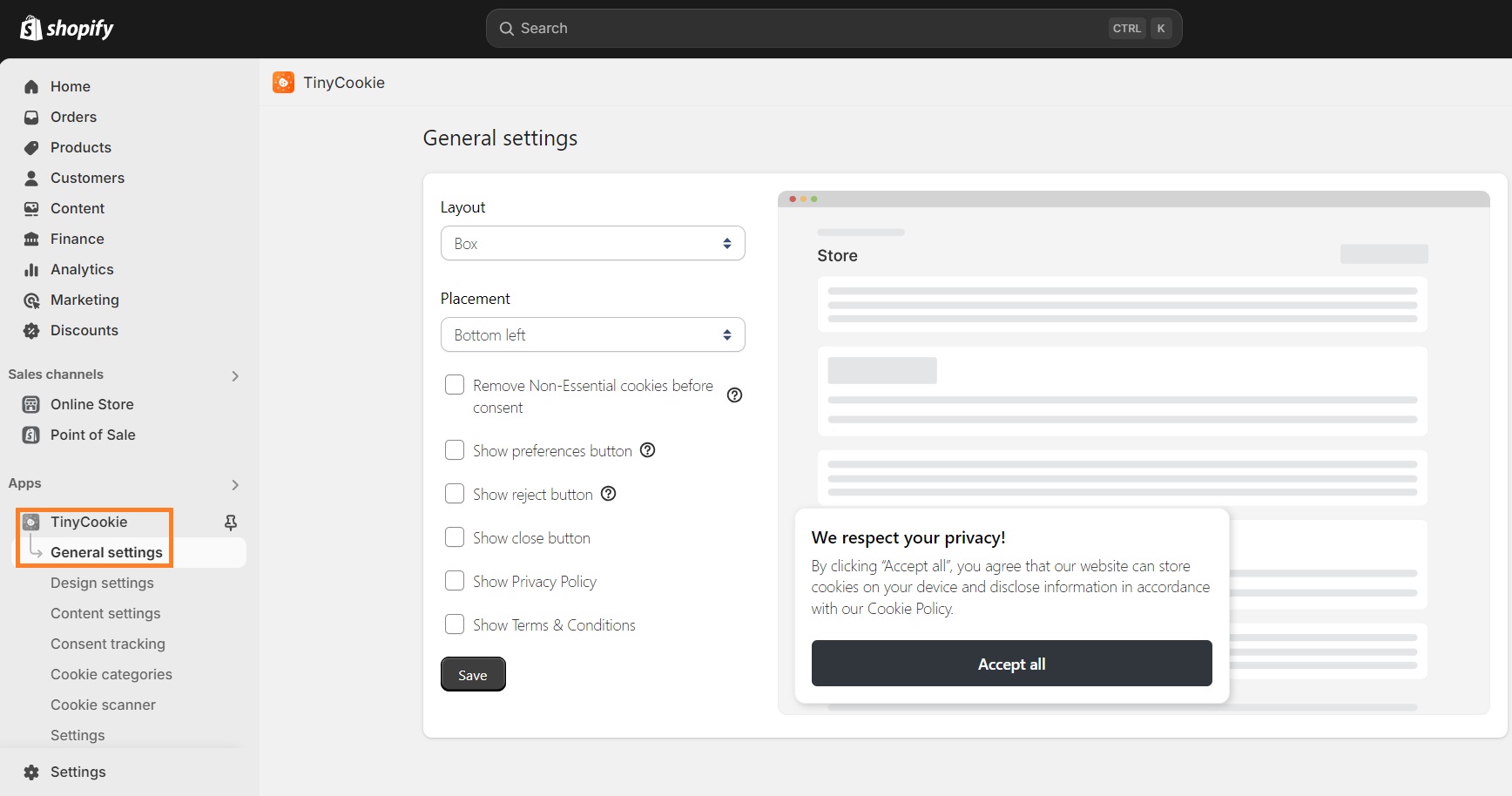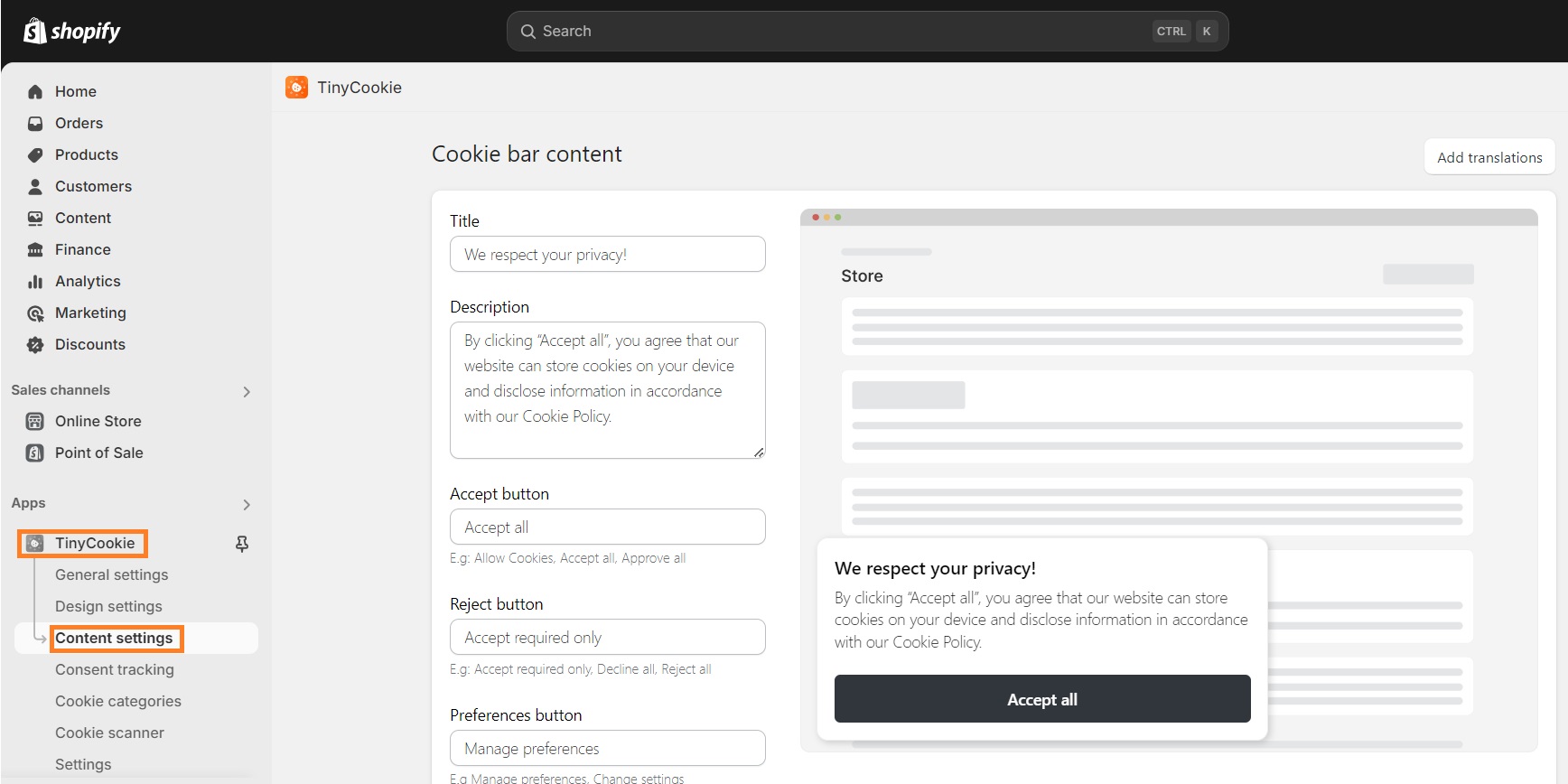A cookie policy on Shopify is required by law in many countries if the website uses cookies. It should be written in plain language and provide users with all necessary information, like managing cookie preferences. Additionally, it should explicitly mention all cookies used, what they are used for, and for how long.
However, it can be challenging to know where to start. That’s why in this guide, we’ll teach you how to write a cookie policy for Shopify that’s compliant with important privacy laws.
Create a cookie consent banner, manage cookies, and collect user consents automatically – all in one app
Try TinyCookie for freeWhat is a cookie policy?
A cookie policy is a legal document that’s used to list all the cookies that a website uses and their purpose as well as expiry dates. It aims to inform users about specific cookie usage on their devices and how a website collects and processes user data.
According to a report by Deloitte, 65% of people say that excessive cookie use raises privacy concerns for them. That’s why it’s important to be clear about your intentions and provide users with all the necessary information about how their data is being used.
Do I need a cookie policy on Shopify?
If your Shopify website uses cookies, you must have a cookie policy that’s compliant with relevant privacy laws. Even if your company is from a country where a cookie policy isn’t required, you should consider international users who may stumble upon your website.
So, here are a few main reasons why a cookie policy is important:
- Protects you from legal action against your company or getting fines for the misleading use of cookies.
- Ensures higher customer trust by giving them information on how they can take control of their own data.
- Demonstrates that your company is transparent with its users.
What are cookie policy compliance requirements?
Cookie policy requirements are generally similar but also depend on the privacy laws your website needs to be compliant with. For example, EU users are protected by GDPR and the ePrivacy Directive, while Californian citizens are protected by the CCPA.
Both privacy laws require website owners to disclose what cookies they use, why they use them, and for how long.
They must also provide users with information on withdrawing consent at any time.
The only difference is that while you can’t enable cookies until given consent under GDPR, CCPA doesn’t require asking for consent unless for minors and sensitive data. Additionally, according to GDPR, website owners must allow users access to the website even if consent is not granted, while CCPA doesn’t forbid restricting access.
How to write a cookie policy?
While a cookie policy is a legal document, it’s not difficult to write if you know where to start. The most important thing is that you keep your sentences short and the language clear. Additionally, don’t forget to include the privacy policy in your cookie consent banner for easy access.
Here’s a complete guide on everything a cookie policy should include:
1. Include a cookie definition
Users reading the policy need to understand what a cookie is. Make sure you write down a clear explanation of what a cookie means in this policy. For example, “In this policy, we use the term “cookies” to define small text files placed on the user’s device when they visit our website.”
2. List of cookies and their use and purpose
A clear cookie policy should list all types of cookies you use on your website and why you use them. Here are common cookie categories:
- Essential – cookies required for the basic functionality of the website.
- Functional – cookies required for remembering user preferences (such as language settings).
- Performance – cookies used to help improve our website’s functionality by collecting data about user behavior on the website.
- Advertising – cookies that help deliver relevant ads based on your interests.
Additionally, don’t forget that you also have to list all third-party services, such as Google Analytics, that have placed cookies on your site. You should provide the purpose of these cookies as well as methods for users to opt out.
3. Add information regarding cookie management
A cookie policy should help users be aware of how they can control their cookies. Provide information and resources on how users can manage their cookies on different browsers or your website.
Make sure your website gives users the option to change their preferences or opt out at any time.
4. Include company information
Your cookie policy must include data about your company, including:
- What is your company
- Company registration number
- Address
- Email or phone number
- Mention the date the cookie policy is effective from
How to add a cookie policy to Shopify?
To add a cookie policy to Shopify, you need to complete two main steps – creating a page for the policy and adding a cookie consent banner. Here’s a complete guide on how to do it:
Step 1: Add a separate cookie policy page
To add a cookie policy page to your Shopify website, follow this simple guide:
- Go to your Shopify Admin dashboard and click the Online Store section.
- Open the Pages section and click Add page.
- Insert “Cookie Policy” as the title and paste your policy in the Content section.
- Click Save.
If you’re mentioning cookies as a section in your privacy policy, you can head to Settings > Policies in the Shopify Admin dashboard and paste the text under the Privacy policy section.
Step 2: Add a cookie consent banner to your website
You can add a cookie consent banner to your Shopify website using a third-party tool like TinyCookie. Just follow this step-by-step guide:
- Head to the Shopify App store and click Install on the TinyCookie page.
- Follow the setup wizard to enable the app on your website.
- Open your cookie consent tool and alter the banner layout or placement based on your preferences in the General settings section. Click Save.
- Go to the Content settings section and alter the cookie consent banner text if needed. Press Save.
That’s it! You can preview how your cookie consent banner looks on your website. TinyCookie also lets you manage what cookies you want to block or add to your website and gathers all user consent forms for your convenience.
Conclusion
A cookie policy is important to have on any Shopify website that uses cookies. Aside from explaining all types of cookies and their purpose, it should also include information on how to opt out or manage preferences and details about the company and its contacts.
Additionally, a Shopify website needs to include a cookie consent banner that leads to the policy. You can easily do that using an app that’s built for Shopify called TinyCookie. It lets you add a banner in a few clicks, collect user consent forms, manage cookies on your site, and more.
Frequently asked questions
All websites that use cookies are required to include a cookie policy. It ensures the company informs users about cookies used on the site, complies with privacy laws, and prevents legal action from being taken against them.
If your USA website uses cookies, you need a cookie policy that’s compliant with relevant privacy laws based on where your audience is from. For example, the California Consumer Privacy Act (CCPA) requires a transparent policy mentioning all cookies used on your website and their purpose.




